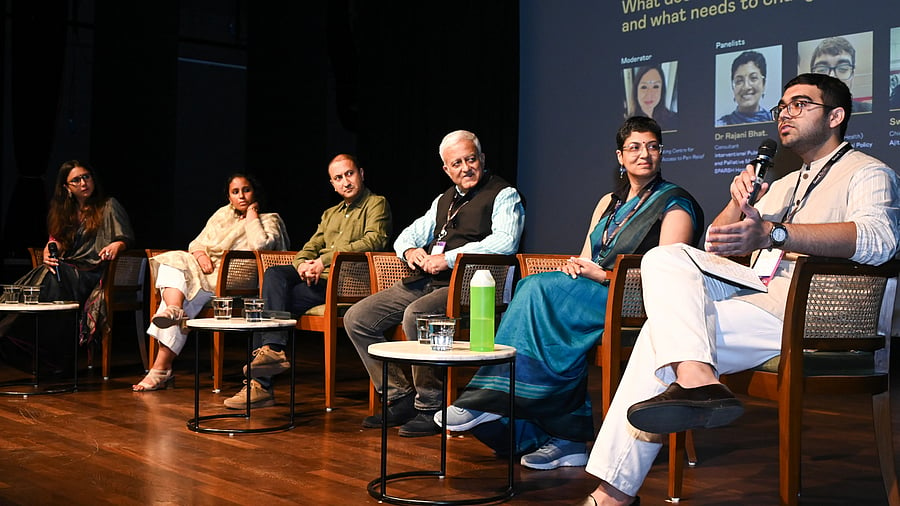
Panelists at the ‘Good to Go’ death literacy festival at the Bangalore International Centre, Bengaluru, on Saturday.
Credit: DH Photo/B K Janardhan
Bengaluru: India’s first death literacy festival opened to a packed auditorium in Bengaluru on Saturday, drawing an audience not only from the city but also from Tamil Nadu, Kerala, and even the UK. Among them were researchers exploring end-of-life experiences, a psychiatrist who noted that neither schools nor culture prepare us to face death, and many professionals working in palliative care. Several others were curious about living wills, also known as Advance Medical Directives (AMDs). It documents a person’s medical treatment wishes if they are unable to communicate.
Bengaluru was a fitting choice to host ‘Good To Go’, a two-day festival encouraging open conversations and planning around death, with an emphasis on patients’ dignity and rights. Karnataka has become the first Indian state to implement the Supreme Court’s 2023 guidelines, legalising AMDs and the withdrawal of life support for terminally ill patients.
During his keynote, health minister Dinesh Gundu Rao said he didn’t yet know how many in the state had drafted an AMD but was considering making one himself to inspire others.
Rao said hospitals need to adopt advance care planning practices like AMDs, as they play a key role in educating patients. He also expressed willingness to review the existing policy and address any “roadblocks” to its implementation. Responding to this, the next speaker, Dr Nagesh Simha, medical director of Karunashraya Hospice, pointed out that the palliative care policy needs a review and urged action on the virtual platform for drafting AMDs.
Busting the myth that end-of-life care planning is elitist, festival director Smriti Rana from Pallium India revealed that 40% of those in Kerala who have written their AMDs are fisherfolk and farmers. “They don’t want their families spiralling into financial toxicity, their children dropping out of school, or their homes mortgaged,” she explained, noting that the financial burden is often as real as the illness itself. Highlighting a paradox, she added that in India, one of the most marginalised groups in palliative care are the affluent, as the private hospitals they visit often don’t offer it “because it’s not profitable”.
The lack of palliative care departments in hospitals, and the near absence of at-home care, came up during the panel discussion, ‘What Does Dying in India Look Like and What Needs to Change?’ and was echoed by the audience during the Q&A session. “We need mandatory regulations. Why can a hospital with an ICU not have a palliative care department?” asked an audience member.
The journey to India’s right to die with dignity was also discussed. Consultant neurologist Dr Roop Gursahani, who assessed the Aruna Shanbaug case, a nurse left in a vegetative state for decades after a brutal assault, emphasised that “implementation requires laws” for advance care planning to be truly realised in India.
Adding to this, Hardik Dua, advocacy officer at the Vidhi Centre for Legal Policy, explained that during the landmark Aruna Shanbaug judgement, concepts like AMDs and patient autonomy were absent; the case was linked directly to Article 21, which guarantees the right to life. The Supreme Court rulings in 2018 and 2023 have since expanded patients’ rights.
Despite the grim topic, the event included moments of lightness and optimism. Organisers encouraged the audience to access a toolkit for advance care planning via a QR code. It includes templates for AMDs and healthcare attorney authorisation in languages such as Kannada, Malayalam, and Tamil.
On Sunday, Day 2 of the event, a workshop on drafting AMDs and legal guidance will be held at Bangalore International Centre, Domlur.